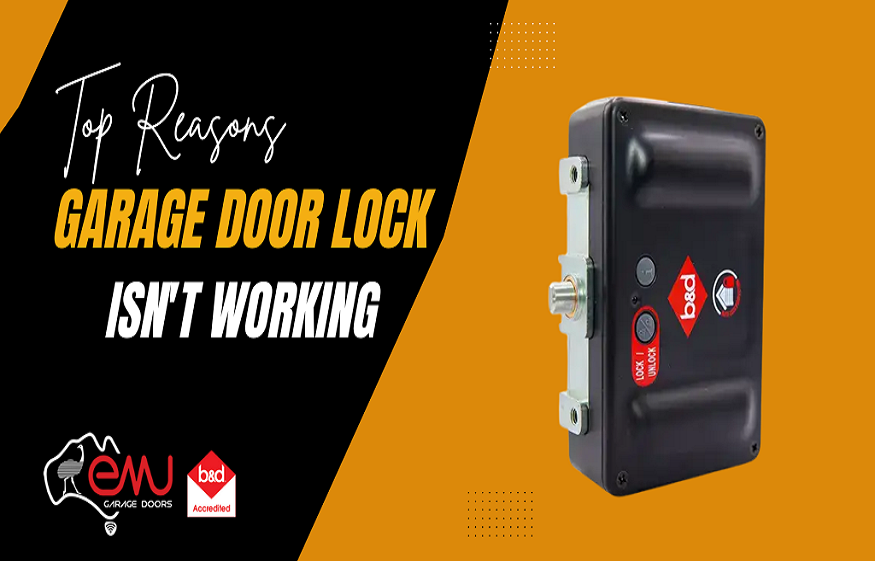Imagine coming home after a long day only to find your garage door lock won’t budge. Frustration sets in, and you’re left wondering what went wrong. A functioning garage door lock is crucial for both security and convenience, protecting your belongings and providing easy access to your home. Whether you have a manual or electric garage door, a malfunctioning lock can be a major headache.
Emu Garage Doors in this blog aims to identify the common causes of garage door lock problems and provide practical solutions to get your lock working again. As a specialist in B&D garage doors, we offer expert insights and solutions to ensure your garage door remains secure and functional.
Common Causes of Garage Door Lock Problems
Frozen Lock/Mechanism
During cold weather, moisture can seep into the lock mechanism and freeze, preventing the lock from turning.
- Solutions:
- Use a lock de-icer specifically designed for frozen locks.
- Gently warm the lock with a hairdryer (avoid excessive heat).
- Apply a silicone-based lubricant to prevent future freezing.
Dirt and Debris Buildup
Over time, dirt, dust, and debris can accumulate inside the lock cylinder, hindering the smooth operation of the key and internal components.
- Solutions:
- Use compressed air to blow out loose debris.
- Apply a specialized lock cleaner to dissolve stubborn grime.
- Follow up with a graphite lubricant to ensure smooth movement.
Misaligned Locking Mechanism
Wear and tear or accidental impact can cause the locking bars or pins to become misaligned, preventing the lock from engaging properly.
- Solutions:
- Visually inspect the locking mechanism for any obvious signs of misalignment.
- If you’re comfortable and knowledgeable, carefully adjust the locking bars or pins.
- If you’re unsure, it’s best to call a professional.
Broken or Worn-Out Parts
Internal lock components, such as springs, tumblers, or levers, can break or wear out over time, leading to lock failure.
- Solutions:
- Identify the damaged part by disassembling the lock (if you know how).
- Replace the broken component with a compatible part.
- If the lock is very old or severely worn, consider replacing the entire lock.
Key Issues
A bent, broken, or worn-out key can prevent the lock from turning or engaging correctly.
- Solutions:
- Try using a spare key to rule out key-related issues.
- If the key is slightly bent, you might be able to carefully straighten it.
- If the key is broken or severely worn, have a new key made by a locksmith.
Electric Opener Issues (For Electric Garage Doors)
Electrical issues or problems with the garage door opener’s locking mechanism can sometimes interfere with the operation of the manual lock.
- Solutions:
- Check the power supply to the garage door opener.
- Inspect the locking mechanism of the opener for any signs of damage or malfunction.
- Consult a qualified garage door technician for assistance.
Corrosion
Rust and corrosion can seize up the internal components of the lock, preventing it from operating smoothly.
- Solutions:
- Use a rust remover to loosen corroded parts.
- Apply a protective lubricant to prevent further corrosion.
- If the lock is severely corroded, it may need to be replaced.
Damaged Lock Cylinder:
The lock cylinder itself can become damaged due to wear and tear, corrosion, or attempted break-ins.
- Solution: If the cylinder is visibly damaged, it will likely need to be replaced. This is a job best left to a locksmith or garage door technician.
Faulty Locking Mechanism:
The internal locking mechanism of the garage door itself can malfunction, preventing the lock from engaging.
- Solution: This issue often requires professional assistance. A garage door technician can diagnose the problem and repair or replace the faulty components.
Weathering and Rust:
Exposure to the elements can cause rust and corrosion, which can seize up the lock.
- Solution: Regularly inspect your garage door lock for signs of rust. Apply a rust inhibitor and lubricant to protect the lock. If the rust is severe, replacement might be necessary.
Incorrect Installation:
If the garage door lock was improperly installed, it may never function correctly.
- Solution: If you suspect incorrect installation, consult a professional garage door installer to assess and correct the problem.
When to Call a Professional
- If you’re unsure about any repair procedures.
- If the problem persists after trying DIY solutions.
- If the lock is severely damaged or corroded.
- If you have an electric garage door opener with locking issues.
- If you require a lock replacement.
A malfunctioning garage door lock can be a frustrating experience, but by understanding the common causes and implementing the appropriate solutions, you can often restore its functionality. Remember to prioritize safety and seek professional assistance when needed.
Regular garage door maintenance lock will ensure its longevity and reliability, providing you with peace of mind and convenient access to your home. Don’t let a faulty lock compromise your security. Take action today and address any lock issues promptly.
For professional garage door lock repairs and maintenance in Sydney, trust the experts. Contact us today at Emu Garage Doors for reliable service. Call us at 02 9030 0686 to schedule an inspection or get expert assistance with your garage door lock issues. Don’t wait—secure your home with a fully functional garage door lock!


